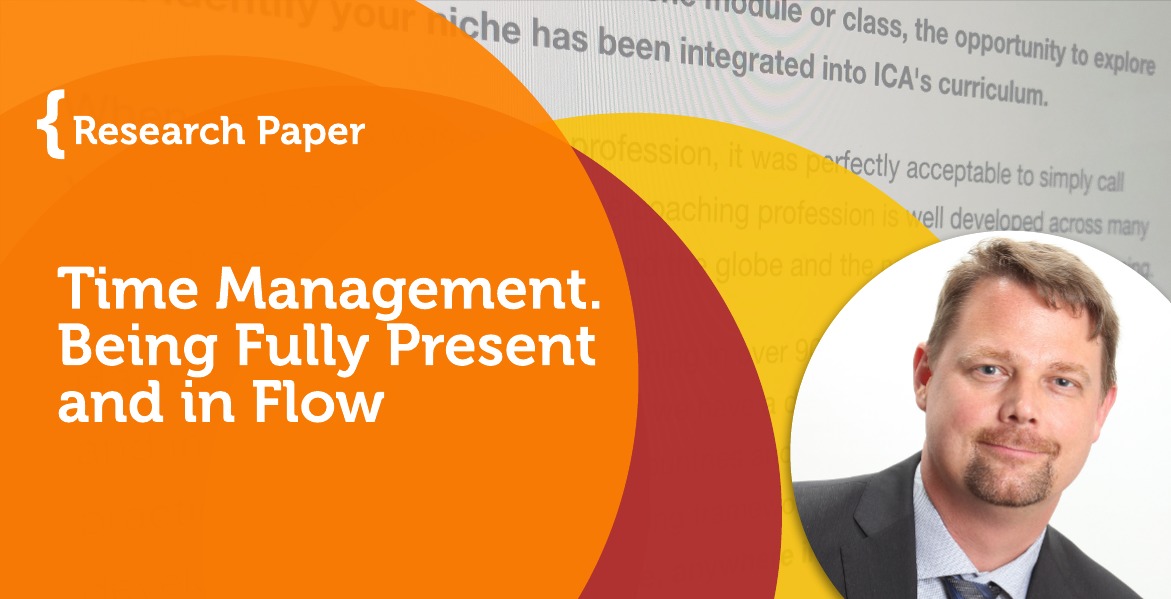Research Paper By Donnie Wells
(Transition Coach & Leadership Coach, UNITED STATES)
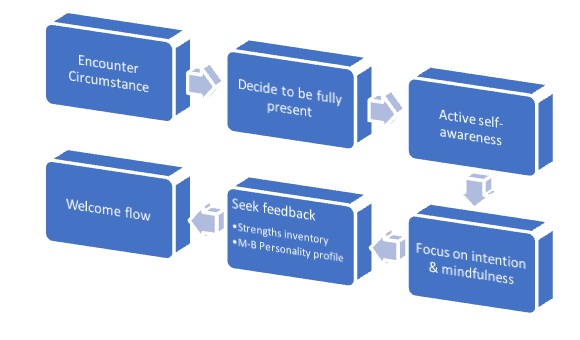
Have you ever noticed that sometimes time seems to both speed up and slow down at the same time? During those moments you tend to be able to accomplish much, feel joy, and be at peace with both the amount you are achieving and the manner in which you are getting things done. Being in the “flow” can also be stated as “being in your sweet spot”. This paper will help clients better understand the relationship they have with time and become more aware of how they use it. Ultimately, helping clients become more fully “present” as they move from moment to moment in their lives is worthy of exploration. This paper will weave mindfulness, Myers-Briggs, and Gallup StrengthsFinder into the self-awareness journey into a “flow state”.
Let’s first explore the finite element of time itself. We as humans can take our time for granted, but that can be a foolish approach. It is often said that there are two constants in life: death and taxes. Our relationship with time can be overlooked as we move from day to day without giving enough attention to our “intention”. Constantly reacting to life circumstances can leave a trail of regrets, frustrations, and disappointments. The average human lives just over 26,000 days and then they die. One of the greatest life mysteries is that we don’t know the time of death. We are not guaranteed those number of days as evidenced by the death of loved ones well before they get into their 70’s. A traditional relationship view of time is illustrated below:
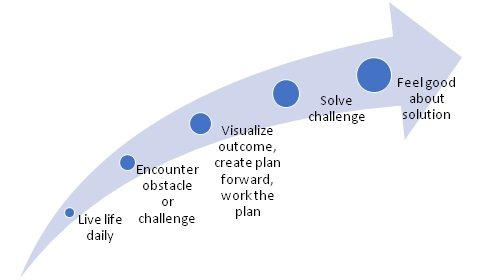 Figure 1. Outcome-based relationship with time.
Figure 1. Outcome-based relationship with time.
A challenge with the approach above is that significance is attached to solving challenges in ways that we, as humans, find pleasing. This approach tends to work well when problems are solved and a rewarding path forward materializes. However, oftentimes a path forward is not clear and the outcome cannot be visualized. When a solution becomes elusive, negative emotions such as anger, frustration, disillusionment, and hopelessness can creep into a person’s physique. The graphic below shows a standard “stuck scenario.
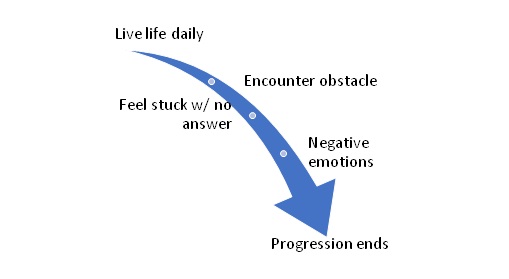 Figure 2. “Stuck” relationship with time.
Figure 2. “Stuck” relationship with time.
A person’s “intention” is their goal, purpose, or aim towards a future state of mind. Examples of a person’s intention can be as follows:
The intention that a person puts forth in life is closely aligned with their deeper sense of purpose and is deeply connected to the way they exert their will over time in life.
Let’s consider 2 circumstances that often present themselves to people:
- Why did my loved one treat me poorly?
- Why can I not get that new job or promotion?
Examination of these areas will show that a traditional view (Figure 2) can leave one feeling stuck or lost. The reason for this is the desired outcome falls outside of a person’s full control. We cannot force another person to treat us nicely and with respect. Further, we cannot force people with a higher authority to promote us. Discerning what can and cannot be controlled is paramount for personal development. The figure below illustrates a flow-based relationship with time that is intentional.
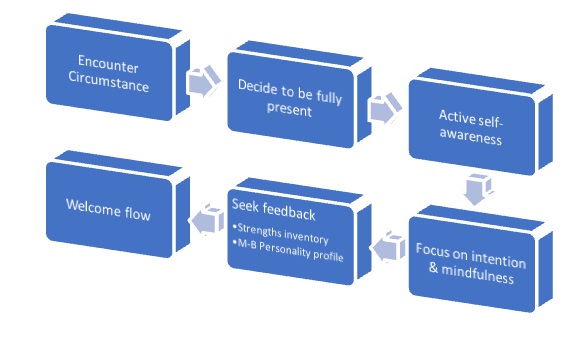 Figure 3. Flow-based relationship with time.
Figure 3. Flow-based relationship with time.
Self-awareness, presence, and mindfulness are important pieces of “getting into the flow”. Helping clients understand their strengths and personalities is critical as they explore their daily intention. Each person has a unique set of strengths and personality. Gaining clarity in these areas can help clients connect with a deep sense of themselves.
The strength-based approach allows for habitable conditions for a person to see themselves at their best, in order to see the value they bring, by just being them. Then moving that value forward to capitalize on their strengths rather than focusing on negative characteristics. (Stoerkel, “What is a Strength-Based Approach?)
Online tools can offer an abundance of ways to help clients create an inventory of their strengths. One tool is Clifton Strengths. Gallup offers an inexpensive assessment that narrows people’s strengths to a “top 5”. It takes about 30 minutes and a report is provided at the end.
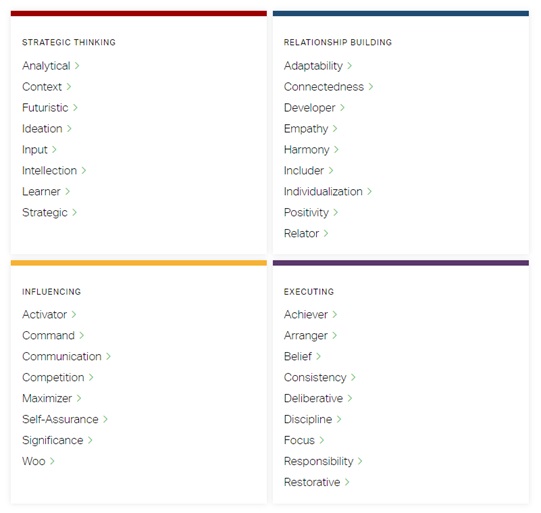 Figure 4. Gallup Strengths Finder inventory.
Figure 4. Gallup Strengths Finder inventory.
It is powerful to help clients find their strengths as it relates to slowing things down and getting into the flow. A keen discipline of mindfulness is needed to encounter life circumstances in a flow mentality. Fully being aware of strengths matched with the moment by moment application of those characteristics drives client thoughts, behavior, and intention. What Is Mindfulness?
Mindfulness is a state of active, open attention to the present. This state encompasses observing one’s thoughts and feelings without judging them as good or bad. (PsychologyToday)
How can one develop mindfulness? While this intentional behavior can be learned, there are some personality types that seem to be more inclined to master this approach as seen in the Myers-Briggs.
The Myers-Briggs Personality Type Indicator is a self-report inventory designed to identify a person’s personality type, strengths, and preferences. The questionnaire was developed by Isabel Myers and her mother Katherine Briggs based on their work with Carl Jung’s theory of personality types. (Kendra, 2019)
The 16 M-B personality types are as follows broken into 4 larger categories with their respective relationship with time (Storm, 2018 and Venngage, 2020):
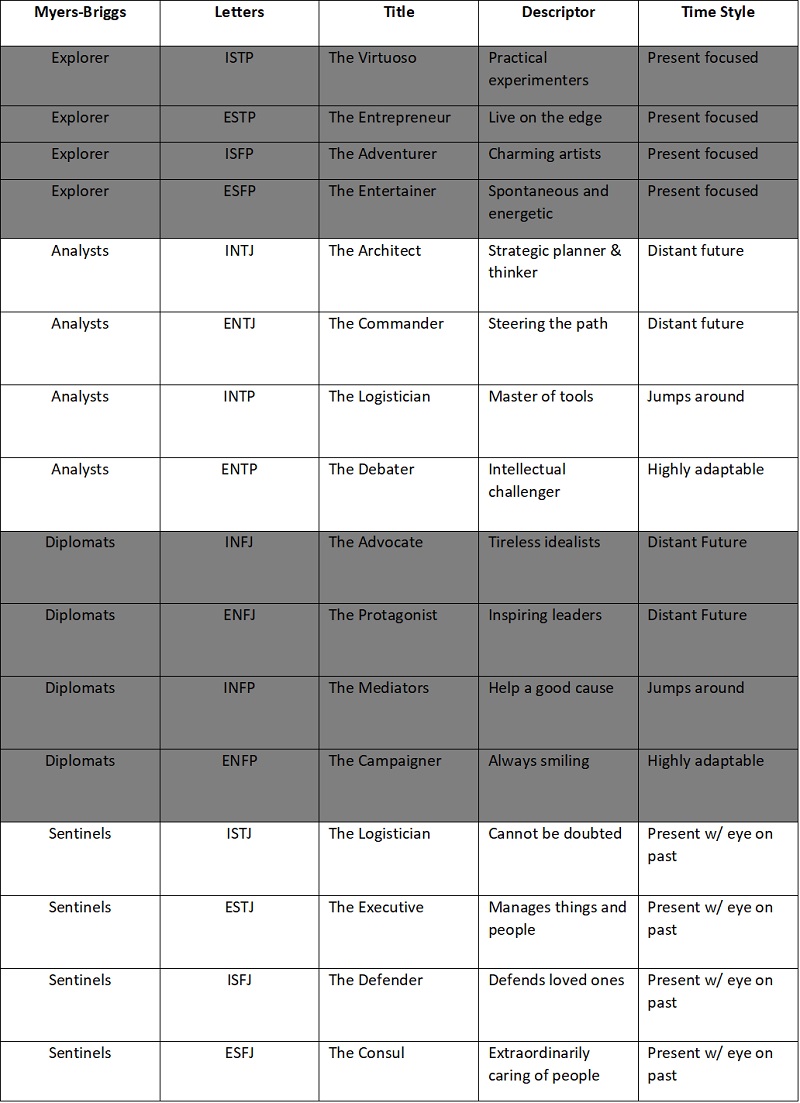 Table 1. M-B types and preferred time style.
Table 1. M-B types and preferred time style.
Each type has a natural tendency towards time management as seen in table 1. It is important to realize that being self-aware compensates for natural tendencies. As an example, let’s explore a hypothetical individual that has inventoried the tools mentioned above (daily intention, mindfulness, strengths, and Myers-Briggs):
John Smith happens to be an INFJ (The Advocate). He is known as a tireless idealist and frequently spends his time dreaming about distant future possibilities. He is very self-aware and practices mindfulness daily. He is also aware of his top 5 Gallup strengths that he is a Futuristic, Adaptive, Deliberative, Relator, and a Learner (see appendix B for more details). He activates these strengths as necessary to compensate for blind spots. He has developed a keen discipline around how he spends his time. Areas that require focus on present issues and challenges take precedence over matters that can be put off. He is deeply introverted and prefers to spend hours alone reflecting on “what could be” as ideas come to mind. He also recognizes that he lives in the present moment. As such, he takes 2 hours each day to review short-term goals that drive present state goals. He exercises daily self-care and allows himself to take long walks in nature to dream about future possibilities. He relaxes into his natural self without harsh judgment of himself or others. He accepts his introverted personality.
Notice from the previous table that INFJ’s naturally relate to distant future dreams. In this example of John Smith, he realizes that he can be swept away from the present moment. He grants himself “dreaming time”, but he also has the discipline to stay present at least 2 hours every day to tackle present challenges. He relishes times with co-workers where they brainstorm new ideas about what “can be” in 10 years. He accepts that he is not one to focus on near-term execution plans. He can do so, but it drains him excessively. A graphical representation of John Smith’s daily intention is below:
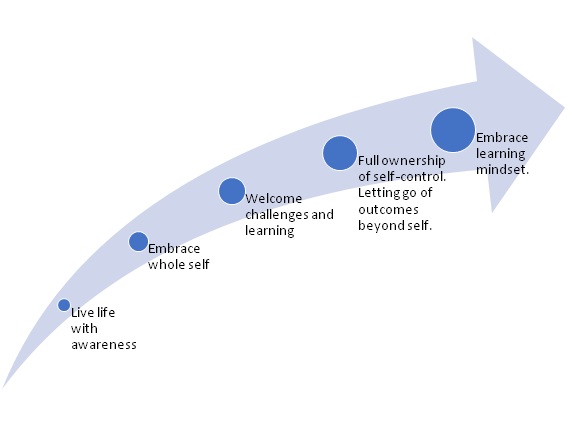 Figure 5. Learning relationship with time. Obstacles and challenges simply teach awareness.
Figure 5. Learning relationship with time. Obstacles and challenges simply teach awareness.
In conclusion, human beings are formed in all sorts of sizes, colors, and beliefs. Their relationship with time and how it is used can become reactionary and haphazard. They can choose a more relaxed and conflict-free existence. Helping them take pause to inventory their strengths, natural personality style and view on time can open them up to learning. Achieving a state of flow can happen for clients if they are willing to let go of outcomes beyond their control. It can occur more naturally if the focus daily is on self-awareness, intention, and a belief that time is precious. Learning new things and self-awareness is a gift to be cherished.
Tomorrow is not guaranteed. Yesterday cannot be changed. All we really have is our present moments. Treat them as precious gifts.
Appendix A. Myers-Briggs Detail
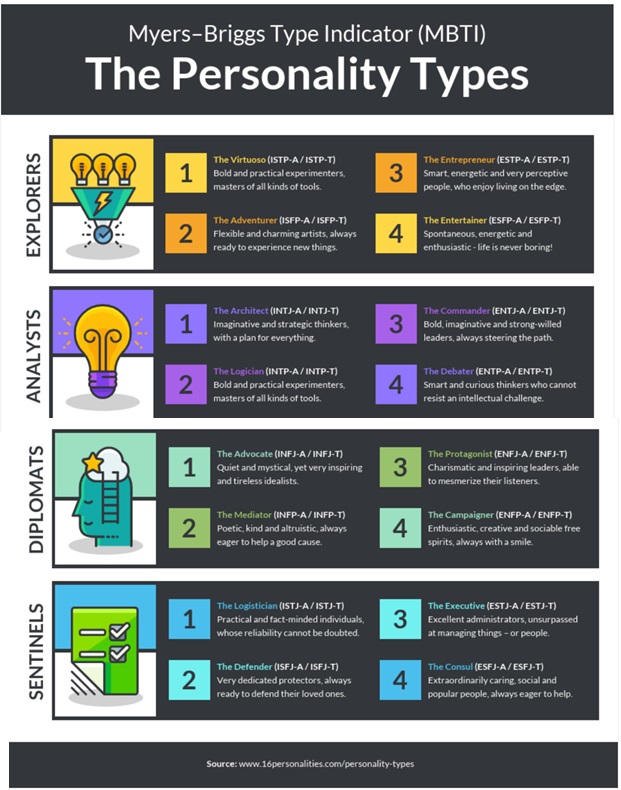
Appendix B. Strengths Finder Assessment for John Smith
Copyright © 2000, 2006-2012 Gallup, Inc. All rights reserved.
Adaptability
Shared theme description
People who are especially talented in the Adaptability theme prefer to “go with the flow.” They tend to be“now” people who take things as they come and discover the future one day at a time.
Your personalized strengths insights
What makes you stand out? Instinctively, you generally find it is easier to get to know someone when they understand how to take life easy. Unraveling the mystery of what makes a person unique cannot be rushed, in your estimation. This explains why you may avoid people who are constantly hurried, stressed, or tense. Chances are good that you might have an ability to accept and deal with each day as it unfolds. You may be flexible enough to handle unexpected discoveries and situations. By nature, your labor tirelessly on whatever needs to be accomplished today. You likely are willing to change your plans when the people around you change theirs. You ordinarily remain quite calm when others reverse their decisions, modify their schedules, or cancel their appointments. It’s very likely that you picture yourself handling situations and issues that could arise in the coming months, years, or decades. You mentally rehearse what you plan to do in various worst-case and best-case scenarios. Your forethought prepares you to deal with whatever happens. You are a flexible person. You are not easily flustered by unexpected events, problems, or opportunities. Because of your strengths, you are filled with awe by beauty in the world, in people, and in the cosmos. Whether you gaze upon nature’s wonders or marvel at the work of human hands, you are filled with wonder. You can suddenly stop what you are doing to watch a sunset, listen to the rustle of leaves, stand before a work of art, hear a piece of music, look through a telescope, or hold a newborn child. You experience beauty at a level many people cannot imagine. Once the moment has passed, you can still picture the scene or hear the sound in your memory.
Deliberative
Shared theme description
People who are especially talented in the Deliberative theme are best described by the serious care they take in making decisions or choices. They anticipate the obstacles.
Your personalized strengths insights
What makes you stand out? Because of your strengths, you may be earnest, solemn, or businesslike when circumstances require socially correct behavior. Perhaps you thoroughly study certain things before making decisions, designing plans, or taking action. It’s very likely that you might observe the results or successes of someone overtime before you offer any compliments. Maybe you need to know that the person’s accomplishments were more than luck or a matter of circumstances. Perhaps you want to be sure the individual really and truly deserves to be recognized. Driven by your talents, you may have a reputation for thinking through things before you speak. Perhaps this is one reason why some people feel better about themselves when you say, “I truly value your opinion” or “I know you can do this job.” Chances are good that you rarely think about winning the affection of people. Perhaps being your own person is more important to you than being popular with lots of individuals by nature, you offer compliments, but only in a measure equal to the individual’s accomplishment. For that reason, your words may echo in the minds and hearts of certain recipients long after you have uttered them. By acknowledging what people do well, you might convince some of them they truly deserve recognition.
Futuristic
Shared theme description
People who are especially talented in the Futuristic theme are inspired by the future and what could be. They inspire others with their visions of the future.
Your personalized strengths insights
What makes you stand out? Driven by your talents, you occasionally share your dreams about the coming months, years, or decades with people who appreciate your originality. Perhaps less imaginative individuals rely on you to tell them what is possible. Instinctively, you may design forward-looking plans for a specific aspect of your life, such as investments, entrepreneurial ventures, education, vacations, or retirement. By nature, you are eager to get started on a project once you realize what you can accomplish in the coming weeks, months, or years. You work very hard to breathe life into your big dreams. These often push and pull you into the future. Because of your strengths, you think a lot about the coming months, years, or decades. You gravitate to projects and study subjects that promise to shape the future. You enjoy talking about possibilities that exist only in your imagination. You probably worry about being left behind if what you know and do were no longer valued or needed. You prefer to be a pioneer and an inventor. Chances are good that you have a capacity for envisioning what the coming months, years, or decades could, should, or will be like. Frequently you are prompted to transform your ideas into things you can touch, taste, see, smell, or hear.
Relator
Shared theme description
People who are especially talented in the Relator theme enjoy close relationships with others. They find deep satisfaction in working hard with friends to achieve a goal.
Your personalized strengths insights
What makes you stand out? Because of your strengths, you offer guidance to friends who seek your assistance. While you enjoy being helpful, you probably avoid imposing your ideas on someone unless the person makes a special point of asking you to do so. Driven by your talents, you are frequently sought out by people whom you have gotten to know on a personal basis. They come back to you again and again because they trust your judgment. Many of them realize you tailor your words of wisdom to fit their unique needs, strengths, limitations, goals, or personalities. It’s very likely that you consistently measure up to your high expectations when working, studying, or playing. Instinctively, you feel most fulfilled when you are busy and simply performing routine tasks. When you have nothing to do, typically you find something to do. Sitting around and wasting time does not suit you at all. Chances are good that you might notice that people regularly ask you, “What do you think?” This might be because they value your views about particular people, situations, rules, news events, or decisions.
Learner
Shared theme description
People who are especially talented in the Learner theme have a great desire to learn and want to continuously improve. In particular, the process of learning, rather than the outcome, excites them.
Your personalized strengths insights
What makes you stand out? Because of your strengths, you dedicate yourself to acquiring knowledge and using your skills. You likely are self-taught in many ways. You probably work with instructors, trainers, coaches, or mentors. You embrace opportunities to expose your mind to new ideas. You welcome the chance to practice new ways of plying — that is, diligently practicing — your trade or craft. Chances are good that you typically enroll in demanding classes. You thrive in situations where you can test your talents as well as your endurance to discover how much you can accomplish. You need to prove yourself to yourself each day. By nature, you endorse the importance of acquiring additional knowledge and gaining new skills. You regard education as an ongoing activity. Driven by your talents, you can sometimes concentrate for hours at a time, especially to deepen your understanding or generate unique ideas by examining new information. The zest this adds to your life may explain why you are determined to acquire additional knowledge or skills at each opportunity. It’s very likely that you prefer to concentrate on activities, problems, opportunities, or subjects that really intrigue you. Each time you acquire new information, you feel you can help people who need the same information.
Bibliography & Works Cited
Nimbus Web. “Why pausing is so important.” Nimbus Web Helper Blog, Posted on March 22, 2018, https://nimbusweb.me/blog/why-pausing-is-so-important/
Gallup. https://store.gallup.com/p/en-us/10108/top-5-cliftonstrengths. Copyright © 2000, 2006-2012 Gallup, Inc.
Max Roser, Esteban Ortiz-Ospina, and Hannah Ritchie. “Life Expectancy.” Our World in Data, revised in October 2019, https://ourworldindata.org/life-expectancy
Nina Pullano. “HOW MANY HOURS OF SLEEP IS ENOUGH? AGE CHART SHOWS WHAT YOU NEED TO FEEL RESTED. Master your sleep schedule with science-backed guidelines.” Inverse, https://www.inverse.com/mind-body/how-many-hours-of-sleep-do-you-need-to-feel-rested.
Stoerkel, Erika MSc. “What is a Strength-Based Approach? Positive Psychology.com, https://positivepsychology.com/strengths-based-interventions/.
Psychologytoday. Mindfulness. Present Moment Awarenesshttps://www.psychologytoday.com/us/basics/mindfulness
Cherry, Kendra. “An Overview of the Myers-Briggs Type Indicator”. Very Well Mind. Updated July 2019.
Storm, Susan. “Here’s How You Experience Time, Based On Your Personality Type” Posted November 2018. https://www.psychologyjunkie.com/2018/11/09/heres-how-you-experience-time-based-on-your-personality-type/
Venngage. www.16personalities.com/personality-types. https://venngage.com/templates/infographics/myers-briggs-personality-types-list-6623c265-a467-4c84-a789-b2f311054e6a. 2020
